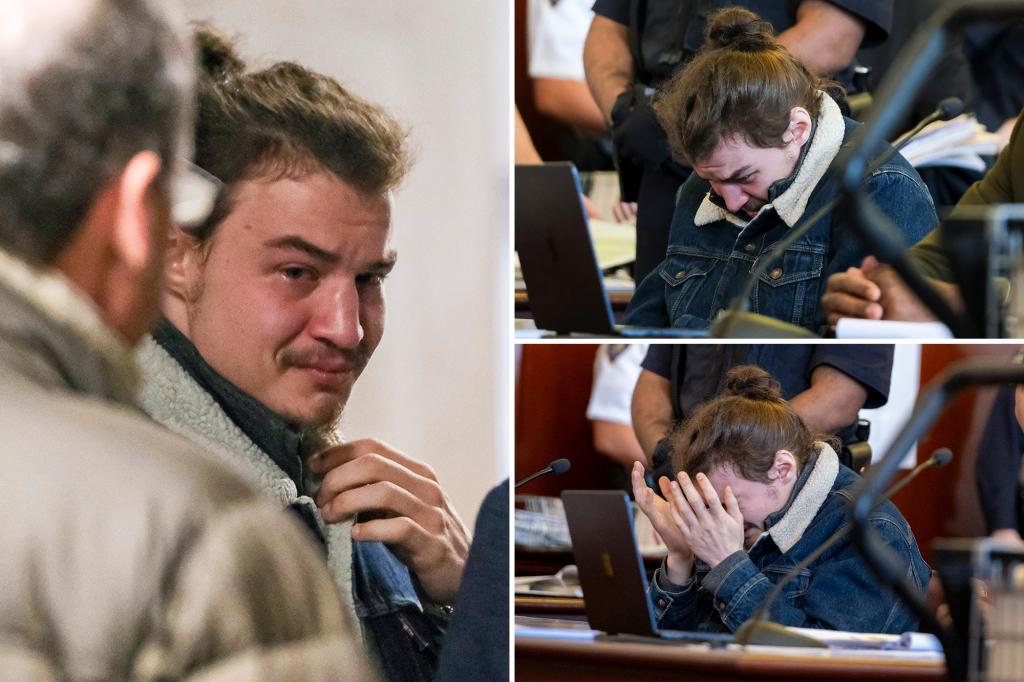In November 2022, a foiled plot to attack New York City synagogues sent shockwaves through the city, exposing a chilling nexus of antisemitism and planned violence. At the center of this disturbing narrative was Matthew Mahrer, a 24-year-old man whose involvement in the conspiracy brought a complex tapestry of personal struggles, ideological contradictions, and legal consequences into stark relief. His sentencing hearing in Manhattan Supreme Court became a dramatic spectacle of remorse and regret, as Mahrer, weeping openly, confronted the gravity of his actions and the impact on his family and the community he betrayed.
Mahrer’s journey to this courtroom began with his association with Christopher Brown, a neo-Nazi with whom he shared a disturbing plan. Brown, armed with weapons and sporting a Nazi armband, was apprehended at Penn Station, triggering an investigation that quickly led authorities to Mahrer. Upon searching Mahrer’s Upper West Side apartment, police uncovered a loaded handgun equipped with an extended magazine and a bulletproof vest, stark evidence of his preparedness for violence. While Brown’s ideology was overtly aligned with white supremacy, Mahrer’s involvement presented a jarring paradox: he is Jewish, the grandson of a Holocaust survivor. This unsettling detail underscored the complex interplay of personal vulnerabilities, extremist influences, and the potential for radicalization within unexpected demographics.
The courtroom drama unfolded as Mahrer, overcome with emotion, expressed remorse for his actions. Sobbing on his mother’s shoulder, he articulated his gratitude that the planned attack had been thwarted, preventing any loss of life. He apologized to his family, acknowledging the profound disappointment and betrayal they must have felt. Mahrer’s attorney, Gilbert Bayonne, attempted to mitigate his client’s sentence by highlighting his autism diagnosis and PTSD, painting a picture of a vulnerable individual susceptible to manipulation. However, Judge Gregory Carro, unmoved by these pleas, handed down a sentence of two and a half years in prison, a stark reminder of the severity of Mahrer’s crime.
The prosecution, led by Manhattan District Attorney Alvin Bragg, emphasized the gravity of Mahrer’s actions, emphasizing his role in facilitating the acquisition of an illegal firearm and extended magazine for Brown. Bragg underscored the use of encrypted messaging apps in coordinating the purchase, highlighting the calculated nature of the plot. He further reiterated the unwavering commitment of his office to hold accountable those who introduce illegal weapons and ammunition into Manhattan, emphasizing the vital importance of safeguarding the city against potential acts of terrorism. Brown, the other key figure in this conspiracy, had already been sentenced to a decade in prison after pleading guilty to possessing a weapon as a crime of terrorism, a testament to the serious consequences of engaging in such activities.
The case of Matthew Mahrer serves as a stark reminder of the insidious nature of extremist ideologies and their potential to ensnare individuals from diverse backgrounds. The fact that Mahrer, a Jewish man with a family history deeply intertwined with the horrors of the Holocaust, could become involved in a plot targeting Jewish institutions underscores the complexity of radicalization and the need for vigilance in combating hate-fueled violence. His tearful apology in court, while seemingly genuine, could not erase the gravity of his actions nor fully explain the motivations that led him down this dangerous path.
The investigation and subsequent prosecution of Mahrer and Brown highlighted the critical role of law enforcement and intelligence agencies in thwarting potential acts of terrorism. The timely intervention of authorities prevented what could have been a devastating attack on the Jewish community in New York City. The case also underscored the importance of community vigilance and reporting suspicious activities, as well as the need for ongoing efforts to counter extremist narratives and prevent radicalization. The sentences handed down to both Mahrer and Brown sent a clear message that such acts of hate and violence will not be tolerated and will be met with the full force of the law.


